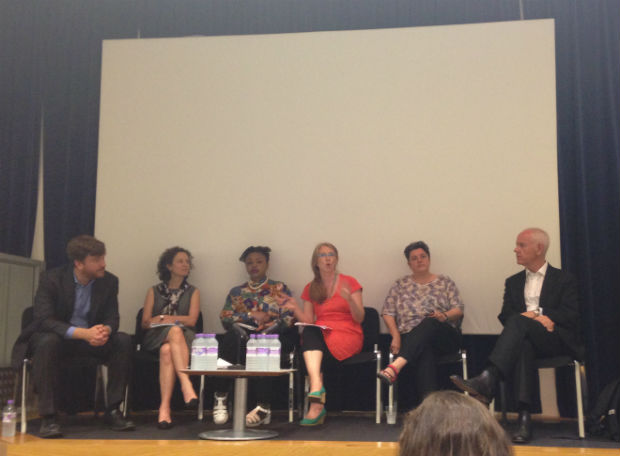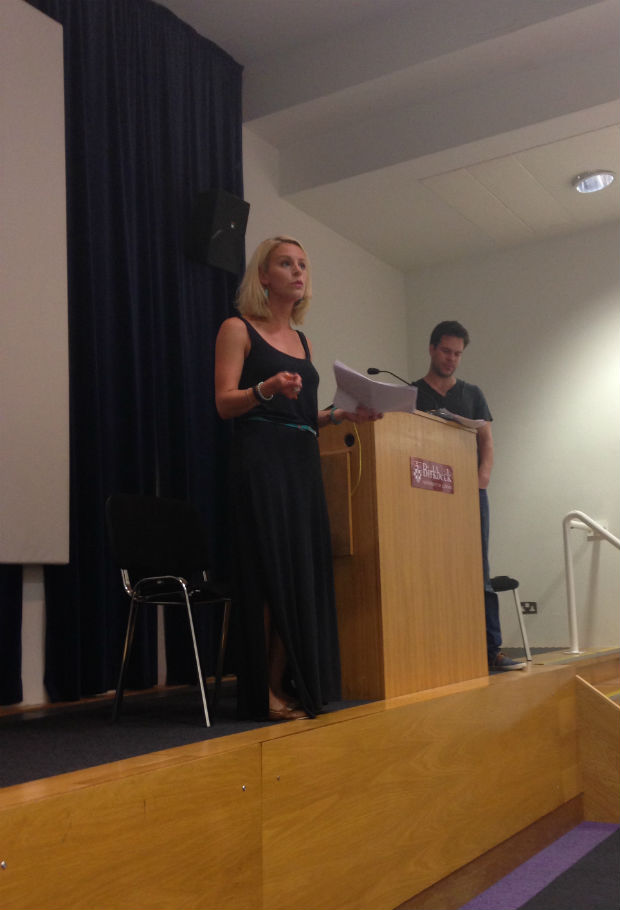
The panel (from left): Greg Lukianoff, Nicola Dandridge, Siana Bangura, Jodie Ginsberg, Julie Bindel and Ken Macdonald (Photo: Index on Censorship)
“I am proud to say that I, myself, am a trigger warning,” said journalist and author Julie Bindel, speaking at the launch of the summer issue of Index on Censorship magazine and its special report on academic freedom.
The panel, chaired by Index chief executive Jodie Ginsberg, also included Universities UK chief executive Nicola Dandridge, blogger and spoken-word poet Siana Bangura, author and president of the Foundation for Individual Rights in Education (FIRE) Greg Lukianoff, and former director of public prosecutions and warden of Wadham College Lord Ken Macdonald.
The debate covered a wide range of issues related to academic freedom globally, from safe spaces and the right to offend, to the absence of absolute freedom of speech and illegal versus legal speech. The event started with a performance from actors Jessica Guise and Jack Wharrier, based on interviews with students and academics from across the world about how it felt to be working and studying in the academic sphere today.
“It’s a very few highly privileged, pampered students who sit around controlling feminists societies,” said Bindel, who has been no-platformed by the UK’s National Union of Students over her writing, adding that “what they’re doing is bullying some of the less vocal, less confident women in the room”.
Lukianoff identified the bureaucratisation of universities, fear of liability and ignorance of the law as challenges to academic freedom in the US.
“I’m a First Amendment lawyer, but you don’t have to be a First Amendment lawyer to know that under the American First Amendment you can’t tell someone that they’re restricted to a tiny ten by ten zone on a massive public campus and that’s the only place they can hand out copies of the constitution. Yet nonetheless I have to take universities to court in order to demonstrate that,” he said.

Actors Jessica Guise and Jack Wharrier performed interviews with students and academics from across the world (Photo: Index on Censorship)
Bangura posed the question of who freedom of expression is for at universities. Among other things, she pointed to the lack of diversity among UK professors, of which only 0.49% are black. “When we’re always talking about who gets to say what, there’s a certain type 0f person saying stuff in the first place.”
She also addressed the idea that students are limiting free expression on campus: “I think as much as students are part of this debate, we are ignoring the bigger powers that be. Students only have a limited amount of power.”
The issue of security was also discussed. “How, from a universities perspective, do you manage these events if you have good reason to believe there could be violence if someone speaks?” questioned Dandrige.
On this, Macdonald spoke of the dangers of a “heckler’s veto”, saying: “I can ring up any university and say ‘I’m going to do a bomb threat if professor Norman Finkelstein is speaking next week’ and so the university cancels the event. This is a heckler’s veto.”
Read more about the global situation for freedom of expression on campus in the latest issue of Index on Censorship magazine. You can see two short videos from the debate below.
This article was posted on 2 July 2015 at indexoncensorship.org




